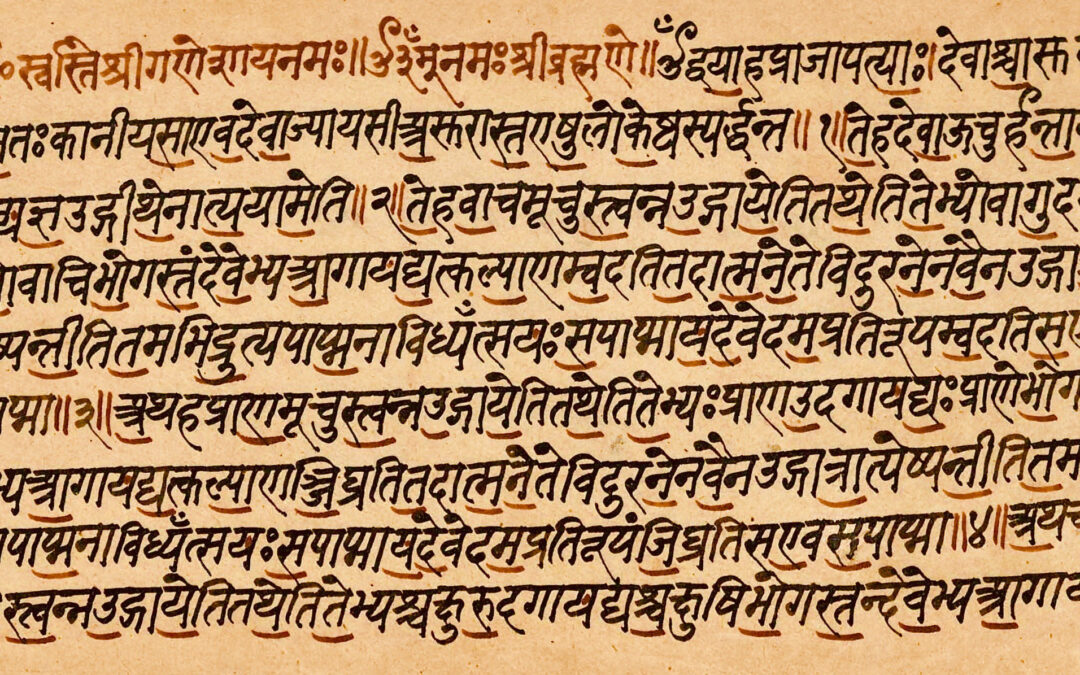The Upanishads are a collection of ancient Hindu philosophical texts that form the basis of Hinduism and have had a profound influence on Indian philosophy and culture. They were composed between 800 BCE and 500 BCE, although some parts may date back even further.
The word “Upanishad” means “sitting down near” and refers to the practice of students sitting at the feet of a guru or teacher to receive spiritual instruction. The Upanishads explore the nature of reality, the self, and the relationship between the individual and the universe. They also discuss the concept of karma, the cycle of birth and rebirth, and the goal of achieving liberation or enlightenment.
The Upanishads contain some of the most famous and beloved teachings in Hinduism, including the concept of Brahman (the ultimate reality), Atman (the true self), and the practice of yoga and meditation. They also discuss the importance of living a moral and ethical life, treating others with kindness and compassion, and cultivating a sense of detachment from material possessions and desires.
Overall, the Upanishads offer a profound and timeless wisdom that continues to inspire and enlighten people from all walks of life. They are considered essential reading for anyone interested in Hinduism, spirituality, or philosophy, and are widely regarded as one of the great treasures of world literature.
The Upanishads offer a complex and nuanced view of human nature, emphasizing the importance of self-knowledge and spiritual practice in order to live a good life. They teach that the true self (Atman) is identical to the ultimate reality (Brahman), and that realizing this identity is the key to liberation or enlightenment.
The Upanishads also emphasize the importance of living a moral and ethical life, treating others with compassion and kindness, and avoiding harmful behavior such as violence or dishonesty. They encourage the practice of yoga and meditation as a means of purifying the mind and cultivating inner peace and clarity.
In addition, the Upanishads teach the importance of detachment from material possessions and desires, and the recognition that all things are impermanent and ultimately unsatisfying. They suggest that true fulfillment and happiness can only be found through spiritual practice and the realization of the true self.
Quotes
- “That thou art.” (Chandogya Upanishad 6.8.7)
- “The self within is smaller than small, greater than great. The self within is hidden in the hearts of all.” (Mundaka Upanishad 3.1.7)
- “As the same fire assumes different shapes when it consumes objects differing in shape, so does the one self take the shape of every creature in whom he is present.” (Brihadaranyaka Upanishad 2.4.6)
- “Truth alone triumphs; not falsehood.” (Mundaka Upanishad 3.1.6)
- “Lead me from the unreal to the real, from darkness to light, from death to immortality.” (Brihadaranyaka Upanishad 1.3.28)
- “You are what your deep, driving desire is. As your desire is, so is your will. As your will is, so is your deed. As your deed is, so is your destiny.” (Brihadaranyaka Upanishad 4.4.5)
- “That which is the finest essence—this whole world has that as its soul. That is reality. That is the self. That thou art.” (Chandogya Upanishad 6.8.7)
- “The mind is everything. What you think you become.” (Mundaka Upanishad 3.1.2)
- “From joy all beings have come, by joy they all live, and unto joy they all return.” (Taittiriya Upanishad 3.6.1)
- “When all desires that surge in the heart are renounced, the mortal becomes immortal.” (Katha Upanishad 2.3.14)
- “He who sees all beings in the Self, and the Self in all beings, hates none.” (Isha Upanishad 6)
- “The wise, beholding all beings in the Self and the Self in all beings, go beyond sorrow.” (Mundaka Upanishad 2.2.9)
- “The Self is the sun shining in the sky; the mind is the moon moving among the stars.” (Brihadaranyaka Upanishad 1.5.20)
- “The knower of the truth, who knows the Self as existing in all beings, truly sees.” (Isha Upanishad 7)
- “One’s own self is well hidden from one’s own self; of all mines of treasure, one’s own is the last to be dug up.” (Chandogya Upanishad 8.7.1)
- “As a man acts, so he becomes. As a man’s desire is, so is his destiny.” (Brihadaranyaka Upanishad 4.4.5)
- “The wise who know the Self as bodiless within the bodies, as unchanging among changing things, as great and omnipresent, do not grieve.” (Katha Upanishad 2.22)
- “The Atman [the Self] is the same in everyone, its highest realization is the highest happiness.” (Chandogya Upanishad 7.26.2)
- “Those who see all creatures in themselves and themselves in all creatures
